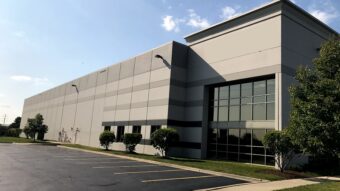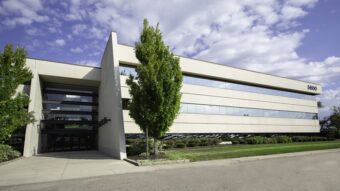By Richard Prokup
senior vice president-First Industrial Realty Trust
 For many years, the real estate management industry has garnered a reputation of being slow to implement new technologies. This has been especially true in the industrial real estate sector, where the property infrastructure is less complex than in the office sector, and ownership concentration is fragmented. Over the last few years, however, the relationship between technology and industrial real estate has changed. Databases have become faster, more reliable and easier to manage. The use of mobile devices, including smartphones and tablets, has grown exponentially. Sophisticated industrial real estate owners are now investing to harness new technological power to improve customer service, reduce costs, and better monitor and manage their assets.
For many years, the real estate management industry has garnered a reputation of being slow to implement new technologies. This has been especially true in the industrial real estate sector, where the property infrastructure is less complex than in the office sector, and ownership concentration is fragmented. Over the last few years, however, the relationship between technology and industrial real estate has changed. Databases have become faster, more reliable and easier to manage. The use of mobile devices, including smartphones and tablets, has grown exponentially. Sophisticated industrial real estate owners are now investing to harness new technological power to improve customer service, reduce costs, and better monitor and manage their assets.
Management of industrial real estate differs from office because, in most cases, industrial leases require that tenants maintain the physical aspects of their buildings. This maintenance includes the periodic inspection and repair of critical components such as HVAC, roof and paving. The useful life of these components can be dramatically impacted by how well the tenant honors their lease obligations. Today, tech savvy owners use detailed databases to do a more effective job of monitoring these components. New database technology can provide instant access to specific information such as the type of HVAC unit or roofing structure, as well as age, service history and anticipated useful life.
What is an example of how access to this data can improve portfolio performance? A property manager can automatically generate a report to analyze a consultant’s estimate of repairs compared to what has actually been spent or is being proposed by a vendor. This deep-dive into the details helps identify deferred maintenance and remedy the situation before bigger problems arise.
Databases are also a great tool to keep track of tenant compliance to lease obligations. By electronically comparing lease provisions to the service contracts or insurance certificates submitted, a manager can determine whether the details match the lease requirements. With the push of a button, one can also have a summary of results to review on a portfolio-wide basis. Especially for larger owners, the ability to compile and analyze data drives operational efficiencies and allows for the creation of metrics that can be reviewed in an objective and accurate manner.
At First Industrial Realty Trust, a portion of the REIT’s monthly operational reporting includes a review of compliance percentages for HVAC, roofing, property inspections and other factors. With this reporting tool, the company is able to monitor compliance and bring additional focus to a specific region, if necessary. In this manner, First Industrial has been successful in maintaining compliance percentages in excess of 95 percent on a consistent basis. With more than 10,000 HVAC units, 2,000 insurance certificates and 1,800 roofing structures in its database, ensuring they are properly cared for is no small task. This disciplined process helps keep customers satisfied through a well-maintained and monitored portfolio, and results in reduced tenant costs, better mechanical performance, and ready access to information.
The next phase in the evolution of the use of technology in commercial real estate is well under way with the growing use of mobile devices. In the past, databases, reports and scanned information were largely inaccessible “from the road.” In industrial real estate, this was often a problem because property managers devote significant time traveling from property to property, meeting with tenants, prospects, and vendors. Today, the innovations in smartphones, tablets and wireless technology are bringing that information to the field. iPads and other tablets are becoming fully integrated workstations with truly amazing powers. Data service from cell phone carriers and Wi-Fi networks enable access virtually anywhere.
With access to your entire office suite, including proprietary databases, in the field, information can be retrieved and used in countless ways to be more productive and provide better service to tenants. A property manager meeting with a tenant who has a question about their lease can now open the lease abstract on a tablet and review and share basic lease information – instantly. Not enough detail? Another click can pull up their full lease document with all of its amendments from an active, up-to-the-minute database.
Leading industrial companies are providing their teams with mobile access to their property management system’s tenant-related data. Information on tenant billing, payables, tenant work orders and the physical aspects of the building can all be accessed by property managers on the road by using iPads, iPhones, or other tablets or smartphones. Maintenance teams can retrieve mechanical details such as the type of filter needed. In an emergency, site plans can be viewed electronically that show the building layout, the location of water shut off valves, and other important components.
Since the information is in an active database rather than a local drive, it can be accessed by anyone within the company if the dedicated property manager is unavailable. Non-proprietary programs like Google Earth help managers quickly identify where repairs need to be made. Over lunch with a tenant, one can check on the status of a work order and email a copy of the most recent roofing report, all without leaving the table. Up-to-date payables information is also available, providing the ability to pull up and analyze a tenant’s account with them – at their desk. In-house space planners can alter a layout for a prospective tenant while walking the space with them, helping them see possibilities that may lead to a signed lease and resulting in a more accurate and efficient work letter.
Smartphones, tablets, and other technological advancements are having a profound effect on how business is done worldwide. Forward-thinking industrial real estate providers are implementing these technologies to enhance customer service through better responsiveness and accuracy and increased productivity. By doing so, maybe the industrial real estate sector can shake off its low-tech image.
Richard Prokup is senior vice president of operations for First Industrial Realty Trust’s Central Region, where he oversees asset management, operations and lease negotiations for a 35 million-square-foot portfolio. Prokup has more than 20 years of commercial real estate experience.



